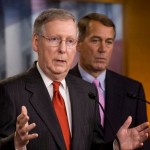Two Cheers for the GOP's Earmark Ban
 Mitch McConnell has finally come around to endorsing a moratorium on earmarks. It's about time, although still not enough to balance the budget.
Mitch McConnell has finally come around to endorsing a moratorium on earmarks. It's about time, although still not enough to balance the budget.
Mitch McConnell has finally come around to endorsing a moratorium on earmarks. It's about time, although it's not enough. However, while the ban won't result in big budget savings, it will alter how deals are made in Washington and could stop Congress from interfering with planning at the state and local levels.
First, even a total end to all earmarks won't do anything to help trim the budget. Earmarks comprise less than one percent of federal spending and much of the money that gets earmarked (even the famous "Bridge to Nowhere") is money that's allocated and spent anyway. Simply eliminating earmarks per se will probably cut less only $1-$2 billion from the budget. All earmarks put together aren't more than $20 billion and a fair number of those are in defense, veterans and other programs Republicans are loathe to shrink overall.
Second, the practice still may help shrink and improve government more than the piddling sums involved indicate at first blush. Quite simply, earmarks are the "currency of big government." Congressional leaders and appropriators intent on getting funding for pet projects often hand out earmarks in order to secure votes for controversial bills. Without this bargaining chip, it will be harder (but far from impossible) to buy off members in return for votes.
Finally, for residents of well-governed states, the most visible and obvious consequence of the end of earmarks will be better roads. This is hardly obvious but it is likely to happen: A huge percentage of earmarks involve highways funds which the federal government distributes based on arcane but essentially fair formulas. Budget rules don't let states get any more than the formulas indicate but members earmark away nonetheless because they like taking credit for new bridges and highways. In most states, this tends to do harm because it lets members of Congress muck with transportation priorities and upkeep plans decided upon by professional state level transportation planners and local communities. Roads to nowhere get built while much-used interstates get neglected.
For people who live in Utah, Florida, Virginia, Texas, and a host of other reasonably well-run states the state transportation planners and local elected officials almost certainly have a better idea of what's needed than members of Congress do. Without earmarks, they'll have more freedom to build the roads people actually need.